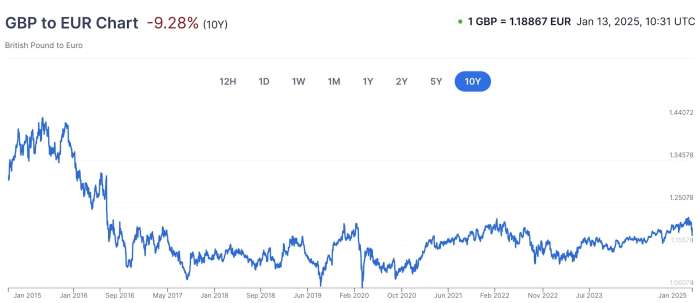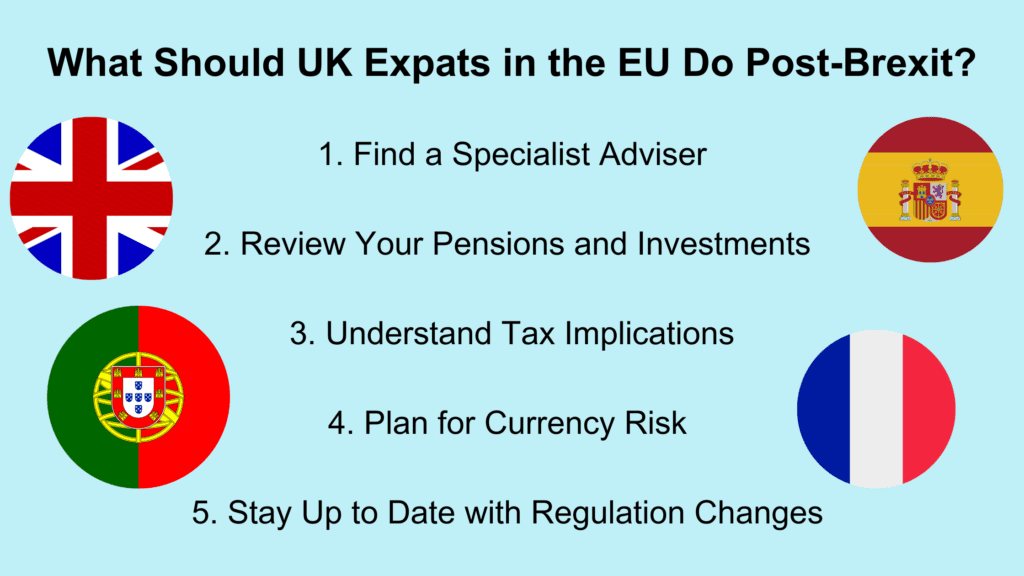
How Brexit Changed Financial Advice for UK Expats in the EU
How Brexit Changed Financial Advice for UK Expats
For British expats living and retiring in EU countries such as 🇫🇷 France, 🇵🇹 Portugal and 🇪🇸 Spain, Brexit has had a profound impact on financial planning.
Many have found themselves unable to access UK-based financial products, while others have struggled to find an adviser willing to work with them.
So, what exactly has changed since the UK left the EU, and what can UK expats do to navigate these new challenges?
Let’s break it down.
UK Financial Advisers Can No Longer Help Expats in the EU
One of the biggest changes post-Brexit is that many UK-based financial advisers are no longer able to work with British expats living in the EU.
Why?
Before Brexit, UK financial advisers could “passport” their services across the EU, meaning they could legally provide financial advice to clients living in France, Spain, Portugal, and other EU countries.
This was possible because the UK was part of the European Economic Area (EEA), which allowed financial services firms to operate across borders without additional regulatory hurdles.
Since Brexit, UK financial firms have lost this passporting ability, meaning that many can no longer advise clients in Europe.
The result? British expats have been abandoned by their UK advisers and have struggled to find new ones who can help them.
UK Expats in the EU Have Lost Access to UK Pension and Investment Products
Another major change is that many UK financial institutions no longer accept expat clients.
This includes pension providers, ISA providers, and investment platforms.
What Does This Mean?
- ISAs: Even prior to Brexit, if you lived outside the UK, you could no longer contribute to an ISA. In addition, while existing ISAs remain tax-free in the UK, they will most likely not be tax-free in your country of residence. You can still switch your ISA from one provider to another. However, this has become more difficult post-Brexit.
- UK Pensions: Some UK pension providers have stopped allowing expats to transfer or consolidate their pensions unless they work with an international adviser. In addition, some won’t pay you your pension benefits if you live in the EU.
- Investment Platforms: Many UK investment providers no longer offer accounts for EU-based expats because they don’t have the necessary regulatory permissions.
This has left many British expats looking for alternative investment and pension options.
Taxation for UK Expats Has Become More Complex
Brexit hasn’t directly changed how UK expats are taxed, but it has created complications.
Key Issues:
- Double Taxation Agreements (DTAs): The UK still has tax treaties with most countries, but understanding how these apply post-Brexit has become more important than ever.
- Cross-Border Pension Withdrawals: If you withdraw money from a UK pension while living abroad, you need to be aware of potential tax liabilities in both countries. For example, if you take your Pension Commencement Lump Sum (PCLS) while resident in the UK, it is tax-free. However, if you take it while resident in France or Spain, it is taxable locally.
- Inheritance Tax (IHT): The UK’s IHT rules still apply to British citizens, even if you live overseas. Planning ahead is now more crucial than ever.
Navigating these complexities often requires specialist financial advice from someone who understands both UK and international tax laws.
Currency Risks Have Increased for British Expats
Since Brexit, the British pound has experienced significant fluctuations, making currency risk a bigger issue for UK expats.

How Does This Affect Expats?
- If you receive a UK pension but live in the EU, a weaker pound means your pension income is worth less in euros.
- If you have UK investments but plan to retire abroad, currency volatility can impact your wealth.
Expats in the EU Need to Be More Proactive in Managing Their Finances
With UK financial products becoming harder to access, tax rules becoming more complex, and currency risks increasing, British expats need to take a more hands-on approach to financial planning.What Should Expats Do?
- 📑 Find a Specialist Adviser – Many UK-based IFAs can no longer help, so finding an adviser who specialises in expat financial advice is crucial.
- 💼 Review Your Pensions and Investments – Make sure your pension provider will still work with you and consider international investment options.
- 💰 Understand Tax Implications – Work with a professional to ensure you’re not paying unnecessary taxes or missing out on tax benefits.
- 💸 Plan for Currency Risk – Consider whether you need to hold assets in different currencies to protect against fluctuations.
- 📊 Stay Up to Date with Regulation Changes – Regularly review your financial plan to stay compliant and tax-efficient.

Case Study: How Brexit Affected Julian & Claire’s Financial Planning in France
Background
Julian and Claire, a British couple in their early 60s, always dreamed of retiring in the French countryside.
In 2018, they purchased a property in the Dordogne and planned to spend their retirement enjoying the relaxed French lifestyle.
At the time, managing their UK pensions and investments seemed straightforward.
They continued working with their long-term UK-based financial adviser and assumed they could easily access their UK financial products after moving.
However, Brexit changed everything for Julian and Claire.
The Challenges They Faced Post-Brexit
1. Their UK Financial Adviser Could No Longer Help Them
Before Brexit, their UK-based adviser could continue to provide financial advice while they were living in France.
But after the UK left the EU, the adviser lost their passporting rights, meaning they could no longer look after Julian and Claire.
They were suddenly without a financial planner and had to find a new adviser who understood the financial landscape both in the UK and in France.
📌 Solution: They found an expat-focused financial adviser who could guide them through the complexities of cross-border financial planning.
2. Loss of Access to UK Investment Accounts
Julian and Claire had UK-based investment accounts, which they planned to use for their retirement income.
After Brexit, their UK investment platform informed them that they could no longer hold accounts as non-UK residents.
📌 Solution: They had to restructure their investments using a tax-efficient French investment wrapper, known as an Assurance Vie, which provided tax benefits in France while still allowing them to invest internationally.
3. Tax Complications on Their UK Pensions
Julian and Claire both had UK defined contribution pensions, which they had planned to transfer to a Qualifying Recognised Overseas Pension Scheme (QROPS) in Malta.
However, new pension transfer rules from HMRC meant that this was no longer an option.
📌 Solution: They worked with their adviser to structure their pension withdrawals in a tax-efficient way, making use of French tax rules to minimise unnecessary taxation.
4. Currency Risk Impacted Their Retirement Income
Since Brexit, the GBP/EUR exchange rate has fluctuated significantly.
Because Julian and Claire were drawing a UK pension but spending in euros, currency volatility directly affected their spending power.
- When the pound weakened, their pension income bought them less in euros.
- When the pound strengthened, they had more spending power, but the unpredictability made budgeting difficult.
📌 Solution: They set up a multi-currency investment strategy and worked with their adviser to hedge against currency risk.
They also started converting their pension income strategically rather than monthly, using a currency service to lock in better exchange rates.

Outcome: A More Secure Retirement Plan
Despite the initial financial setbacks caused by Brexit, Julian and Claire were able to restructure their financial plan to suit their new life in France.
✅ They now work with an adviser who understands both UK and French financial rules.
✅ They moved their investments into a tax-efficient structure suitable for French residents.
✅ They optimised their UK pension withdrawals to minimise unnecessary taxes.
✅ They put a currency strategy in place to protect their retirement income from exchange rate fluctuations.
Their experience shows that while Brexit has made financial planning more complex for UK expats, the right advice can make all the difference.
The Bottom Line: Expats in the EU Need a New Approach to Financial Advice
Brexit has fundamentally changed the financial landscape for UK expats in the EU.
Many have been left without financial advisers, lost access to UK-based financial products, and faced increased complexity in managing their wealth.
But with the right approach, you can still secure your financial future.
Working with an adviser who understands both UK and cross-border financial planning is more important than ever.
If you’re a British expat in the EU and need help navigating these challenges, reach out today.
The right advice can make all the difference.
How Brexit Changed Financial Advice for UK Expats in the EU
FAQs
Brexit has caused significant disruptions in the financial planning of UK expats. Many UK financial advisers can no longer work with expats in the EU, and access to UK-based financial products has become more limited. Additionally, tax rules, pension options, and currency risks have become more complex.
UK financial advisers lost their “passporting rights” after Brexit, which previously allowed them to offer services across EU countries. This means many UK advisers are no longer legally able to provide advice to British expats residing in the EU.
Since Brexit, many UK pension providers no longer allow expats in the EU to transfer or consolidate their pensions unless they work with an international adviser. Some providers may also not pay pension benefits to those living in the EU.
Many UK investment platforms no longer offer accounts for expats in the EU due to changes in regulations after Brexit. This has left many expats looking for alternative investment options in their new countries of residence.
While the UK still has tax treaties with most countries, understanding how these treaties apply post-Brexit has become more important. Brexit has added complexity to how UK expats are taxed in both the UK and their host countries.
Withdrawing money from a UK pension while living abroad may lead to tax implications in both the UK and the country of residence. For instance, taking a pension lump sum in certain EU countries like France or Spain may subject it to local taxes, whereas it was tax-free in the UK.
Currency fluctuations between the British pound and the euro have made it more difficult for UK expats to manage their finances. Expats can protect themselves by using multi-currency investment solutions or working with an adviser to hedge against exchange rate fluctuations.
UK expats should review their pensions and investments with a financial adviser who understands both UK and local tax laws. This may include transferring investments into tax-efficient structures in their country of residence or optimising pension withdrawals to minimise unnecessary taxes.
Post-Brexit, UK expats face increased complexity in managing their wealth, with changing tax rules, pension issues, and currency risks. A specialist adviser can help navigate these challenges and ensure that financial plans remain compliant and tax-efficient.
Expats should regularly review their financial plans with an adviser to ensure they remain compliant with both UK and local regulations. Staying informed about regulatory changes, especially regarding taxes, investments, and pensions, is crucial for long-term financial security.

Talk to an Expert
Brexit fundamentally changed how financial advice works for UK expats in the EU. From lost passporting rights and shifting regulation to the tax treatment of pensions, investments and UK accounts, many long-standing arrangements no longer work as smoothly as they once did.
I am Ross Naylor, a UK-qualified Chartered Financial Planner and Pension Transfer Specialist with nearly 30 years’ experience. I help British expats across Europe understand what Brexit means for their pensions, investments, State Pension and long-term planning.
I firmly believe your location in the world should never be a barrier to expert, impartial and transparent financial advice you can trust.
Whether you are unsure how Brexit affects your existing adviser relationship, what to do with UK pensions and ISAs, how to manage tax between the UK and your EU country, or how to structure investments so they remain suitable and compliant where you live, I will help you make sense of the changes and put a clear, cross-border plan in place.
Book a confidential consultation

